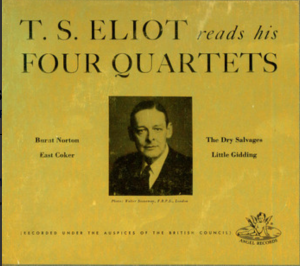 Recordings of readings by TS Eliot himself:
Recordings of readings by TS Eliot himself:
“A recording of a poem read by its author is no more definitive an ‘interpretation’ than a recording of a symphony conducted by the composer. The poem, if it is of any depth and complexity, will have meanings in it concealed from the author; and should be capable of being read in many ways, and with a variety of emotional emphases.
“A good poem, indeed, is one which even the most accomplished reading cannot exhaust.
“What the recording of a poem by its author can and should preserve, is the way that poem sounded to the author when he had finished it. The disposition of lines on the page, and the punctuation (which includes the absence of punctuation marks, when they are omitted where the reader would expect them) can never give an exact notation of the author’s metric. The chief value of the author’s record, then, is as a guide to the rhythms.
“Another reader, reciting the poems, need not feel bound to reproduce those rhythms but, if he has studied the author’s version, he can assure himself that he is departing from it deliberately, and not from ignorance.”
TS Eliot, sleeve note to his recording of Four Quartets, 1947
Eliot’s earliest known recordings, for the Harvard Vocarium label in 1933
Reading at Columbia University, 1933-1935
(Divided into: Ash Wednesday, The Waste Land [two versions], Ariel Poems, Sweeney Amongst the Nightingales [with discussion], Four Quartets and The Hollow Men)
TS Eliot reading The Love Song of J Alfred Prufrock
TS Eliot reading Portrait of a Lady
TS Eliot reading Preludes
TS Eliot reading Gerontion
TS Eliot reading Sweeney Among The Nightingales
TS Eliot reading The Waste Land (1933 recording)
TS Eliot reading Ash Wednesday
TS Eliot reading The Journey of The Magi
TS Eliot reading A Song for Simeon
TS Eliot reading Fragment of an Agon
TS Eliot reading Difficulties of a Statesman
TS Eliot reading Landscapes
TS Eliot reading The Naming of Cats
 TS Eliot reading Four Quartets
TS Eliot reading Four Quartets
Harvard Vocarium Recording: “T. S. Eliot Reading His Own Poetry” (1951)
(The Love Song of J Alfred Prufrock/Gerontion/The Hollow Men/Coriolan: Triumphal March/Journey of the Magi/A Song for Simeon/Coriolan: Difficulties of a Statesman/Sweeney Agonistes: Fragment of an Agon)
There are now a number of recordings of TS Eliot available on Spotify:
Recordings of live performances by TS Eliot:
A live poetry reading Eliot gave at Sanders Theatre, Harvard in 1947. After an introduction, Eliot reads chronologically from a selection which runs from Preludes to Little Gidding.
A live poetry reading by TS Eliot, recorded at the 92nd Street Y, New York, on December 4th 1950. A relaxed Eliot introduces his poems and chats between readings of works including Preludes, La Figlia Che Piange, and Coriolan.
In Eliot’s Auditory Imagination (video), Professor Sir Christopher Ricks explores the significance of Eliot’s pronunciation in his recorded readings.
The Waste Land Reading by TS Eliot, Ted Hughes and Lia Williams
The Waste Land Downloadable audio files
(Article): The 1947 Harvard Vocarium recording of TS Eliot reading The Love Song of J Alfred Prufrock – a fascinating article about the history and auditory patterns of the recording, together with a streaming link to the audio.
